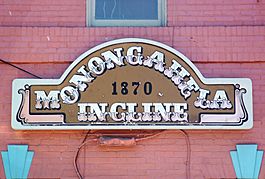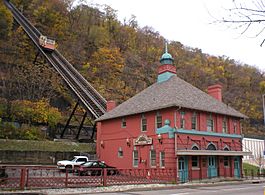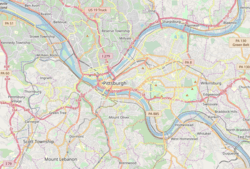Monongahela Incline facts for kids
Quick facts for kids Monongahela Incline |
|
|---|---|
 |
|

Lower station of Monongahela Incline
|
|
| Overview | |
| Owner | Port Authority of Allegheny County |
| Locale | Pittsburgh, Pennsylvania |
| Termini | West Carson Street Grandview Avenue |
| Stations | 2 |
| Service | |
| Type | Funicular |
| History | |
| Opened | May 28, 1870 |
| Technical | |
| Line length | 635 feet (194 m) |
| Track gauge | 5 ft (1,524 mm) |
| Electrification | 1935 |
| Operating speed | 6 mph (9.7 km/h) |
|
Monongahela Incline
|
|
| Location | Grandview Avenue at Wyoming Avenue, Pittsburgh, Pennsylvania |
| Area | 1 acre (0.40 ha) |
| Built | 1869 |
| Architect | John Endres |
| Architectural style | Late 19th And 20th Century Revivals, Second Renaissance Revival |
| NRHP reference No. | 74001742 |
| Significant dates | |
| Added to NRHP | June 25, 1974 |
The Monongahela Incline is a special kind of railway called a funicular. It is located in Pittsburgh, Pennsylvania, near the Smithfield Street Bridge. It was built by John Endres and opened in 1870.
This incline is very important because it is the oldest funicular in the United States that has been running non-stop. Pittsburgh once had 17 passenger inclines, but only two are left today. The Monongahela Incline is one, and the Duquesne Incline is the other. Its lower station is easy to reach from the Station Square shopping area. You can also get there using Pittsburgh's light rail system.
Contents
History of the Monongahela Incline
Why the Incline Was Built
In the 1860s, Pittsburgh's industries were growing fast. This created many jobs, especially for German immigrants. But there wasn't enough flat land for homes. Most of it was used by factories. So, people had to build houses on the steep hillsides of Mt. Washington. This area was also known as "Coal Hill."
Getting between these hillside homes and the city below was hard. There were not many good roads or public transportation. The German immigrants remembered the "seilbahns" (cable cars) from their home country. They suggested building similar inclines on Coal Hill.
Opening and Operation
The Monongahela Incline was the result of this idea. It first opened on May 28, 1870. Before this, some inclines in Pittsburgh were used to move coal. These included the Kirk Lewis incline and the Ormsby mine gravity plane.
Today, the Port Authority of Allegheny County runs the Monongahela Incline. This is the same group that operates Pittsburgh's other public transport. You can even transfer between the incline and the city's light rail and bus systems.
Recent Repairs
In February 2019, the incline had to close. A broken city water pipe caused flooding and damage. It took 13 weeks to fix everything. The incline finally reopened on May 10, 2019, after many repairs.
Monongahela Incline Facts
Here are some interesting facts about the Monongahela Incline:
- Length: It is about 635 feet (194 meters) long.
- Height: It climbs about 369 feet (113 meters) up the hill.
- Slope: The slope is about 35 degrees and 35 minutes.
- Track Width: The tracks are 5 feet (1.524 meters) wide. This is called a broad gauge.
- Speed: The cars travel at about 6 miles per hour (10 km/h).
- Capacity: Each car can carry 23 passengers.
- Opened: May 28, 1870.
- Updates:
- 1882: The structure was rebuilt with steel.
- 1935: The original steam power was changed to electricity.
- 1982-83: The tracks, cars, and stations were updated.
- 1994: The upper and lower stations were restored. New electric motors and controls were added.
Images for kids
 | Tommie Smith |
 | Simone Manuel |
 | Shani Davis |
 | Simone Biles |
 | Alice Coachman |









